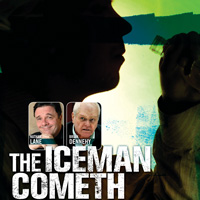THE ICEMAN HATH ARRIVED
Eugene O’Neill’s The Iceman Cometh is a towering play, nearly 5 hours with three intermissions and a cast of 16 major characters. Yet its theme can be summarized in five words—We need illusions to survive. The Goodman Theatre is reviving a basically uncut Iceman (one character has been dropped) in what certainly is the Chicagoland production of the year. The flagship actor is Nathan Lane, best known for his musical comedy performances on Broadway, but the revival is an accumulation of stunning performances, including several by notable Chicago actors who can deservedly bask in the rave reviews the show will get nationally.
The play takes place in 1912. The location is Harry Hope’s saloon and rooming house in New York City’s Bowery. Every day, and most nights, a collection of down-and-out characters gather to drink away their blighted lives, and comfort themselves with the illusion that they are not so bad-off. The three young hookers call themselves tarts, a more genteel term for their streetwalking profession. A black man named Joe Mott dreams of opening his own gambling house for the colored trade. They all kid themselves that they will soon break out of their prison of failure. Tomorrow will be the day they recapture their lives (one of the characters is nicknamed Jimmy Tomorrow) but deep inside they know it won’t happen, so they get through the days and nights with bravado and booze.
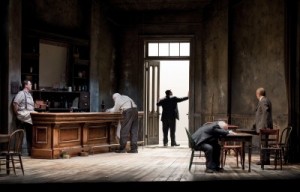 The play turns on the annual visit by Theodore Hickman, fondly known as Hickey, a traveling salesman born to be the life of the party. For years, Hickey has come to Harry Hope’s establishment, telling jokes and buying drinks, jump-starting the dreary lives of the inmates, if only for a few days. But this year’s visit is different: Hickey starts out as his usual expansive glad-handing self, but he has an agenda. Harry is now sober, and insists that the habitués of Harry Hope’s saloon need to divest themselves of their illusions so that they can recognize the truth about themselves and make peace with their condition. Hickey’s evangelizing creates tensions and conflicts among the other characters, who want no part of facing their true selves.
The play turns on the annual visit by Theodore Hickman, fondly known as Hickey, a traveling salesman born to be the life of the party. For years, Hickey has come to Harry Hope’s establishment, telling jokes and buying drinks, jump-starting the dreary lives of the inmates, if only for a few days. But this year’s visit is different: Hickey starts out as his usual expansive glad-handing self, but he has an agenda. Harry is now sober, and insists that the habitués of Harry Hope’s saloon need to divest themselves of their illusions so that they can recognize the truth about themselves and make peace with their condition. Hickey’s evangelizing creates tensions and conflicts among the other characters, who want no part of facing their true selves.
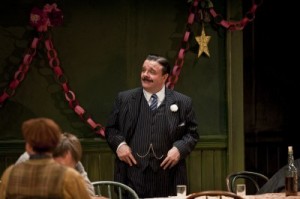 The Iceman Cometh is a great play, but it is also the victim of verbal repetition and an overloaded storyline. Every character mouths “pipedreams” over and over throughout the play, the talisman word for the illusions that, according to Hickey, are holding the other characters captive. The Iceman Cometh isn’t the only O’Neill play with clunky dialogue, but because of its length it may be the worst offender. Also, the majority of characters fall into the same cookie-cutter pattern, hiding behind transparent illusions to avoid facing the reality of their tawdry lives. The play could probably be reduced in length by at least a third and provide the same impact, but that wasn’t O’Neill’s way, and the audience at the Goodman must accept the excesses along with the play’s power and humor.
The Iceman Cometh is a great play, but it is also the victim of verbal repetition and an overloaded storyline. Every character mouths “pipedreams” over and over throughout the play, the talisman word for the illusions that, according to Hickey, are holding the other characters captive. The Iceman Cometh isn’t the only O’Neill play with clunky dialogue, but because of its length it may be the worst offender. Also, the majority of characters fall into the same cookie-cutter pattern, hiding behind transparent illusions to avoid facing the reality of their tawdry lives. The play could probably be reduced in length by at least a third and provide the same impact, but that wasn’t O’Neill’s way, and the audience at the Goodman must accept the excesses along with the play’s power and humor.
Under Robert Falls’ superb direction, the play holds the audience for all four acts. It was a thrilling ride from 7 p.m. to nearly midnight, but I was glad when it was over. I did notice numerous patrons meandering in the lobby during the third intermission, gaunt with fatigue but determined to gut it out for the final hour-long act.
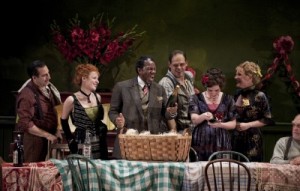 The collection of outstanding performances is likely to be remembered for years to come. Every character has at least one major speech along with the ensemble interaction. This is easily the most emotional reading of Iceman of the three productions I’ve seen. There is an edge of hysteria among the characters that underscores their desperation. The staging is naturalistic, but the acting often achieves an operatic intensity.
The collection of outstanding performances is likely to be remembered for years to come. Every character has at least one major speech along with the ensemble interaction. This is easily the most emotional reading of Iceman of the three productions I’ve seen. There is an edge of hysteria among the characters that underscores their desperation. The staging is naturalistic, but the acting often achieves an operatic intensity.
The climax of the evening is Nathan Lane’s long monologue that consumes much of the final act, an extraordinarily demanding set piece that display’s Lane’s breadth of acting as he confesses to a crime with a rising crescendo of agony, self-loathing, and despair. After a while, however, the piece comes across more as a showcase for Lane’s acting chops than as an expression of Hickey’s tortured psyche.
Lane’s Hickey is the centerpiece of the production, though the character has less stage time than the denizens of Harry Hope’s saloon. But the complementary performances give the revival its magic. By the sheer force of his personality, Brian Dennehy dominates the play intellectually as the one-time anarchist Larry Slade (Dennehy played Hickey in the 1990 Goodman revival). Slade is the most self-aware of the characters, trying to put on a front of “above the fray” cynicism that masks his cowardice and fear of death. While the other characters joyously return to their life-sustaining illusions at the end of the play, Slade sits apart, bleakly staring into the distance.
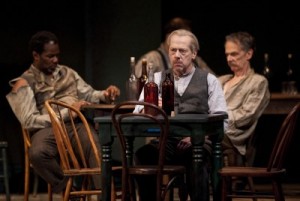 The ensemble is an extended advertisement for the excellence of Chicago acting. There are illustrious performances by Larry Neumann, Jr. (Ed Mosher), Marc Grapey (Chuck Morello), John Judd (Piet Wetjoen), John Reeger (Cecil Lewis), James Harms (ultimately heartbreaking as Jimmy Tomorrow), John Hoogenakker (Willie Oban), Patrick Andrews (Don Parritt), and Kate Arrington (Cora), all mainstays of the area theater scene, along with Lee Stark (Margie) and Tara Sisson (Pearl). Imports include John Douglas Thompson as a brilliant Joe Mott, Stephen Ouimette of the Stratford Shakespeare Festival as Harry Hope, Lee Wilkof, both heroic and pathetic as used-up former anarchist Hugo Kalmar, and Salvatore Inzerillo as the saloon bartender Rocky Pioggi, who pimps the play’s three whores (the bartender refuses to recognize himself as a pimp, claiming it’s a sideline because he has a regular job, another ego-saving illusion).
The ensemble is an extended advertisement for the excellence of Chicago acting. There are illustrious performances by Larry Neumann, Jr. (Ed Mosher), Marc Grapey (Chuck Morello), John Judd (Piet Wetjoen), John Reeger (Cecil Lewis), James Harms (ultimately heartbreaking as Jimmy Tomorrow), John Hoogenakker (Willie Oban), Patrick Andrews (Don Parritt), and Kate Arrington (Cora), all mainstays of the area theater scene, along with Lee Stark (Margie) and Tara Sisson (Pearl). Imports include John Douglas Thompson as a brilliant Joe Mott, Stephen Ouimette of the Stratford Shakespeare Festival as Harry Hope, Lee Wilkof, both heroic and pathetic as used-up former anarchist Hugo Kalmar, and Salvatore Inzerillo as the saloon bartender Rocky Pioggi, who pimps the play’s three whores (the bartender refuses to recognize himself as a pimp, claiming it’s a sideline because he has a regular job, another ego-saving illusion).
The production is largely conversation and monologue, with the characters spread horizontally across the Goodman stage, gathered around the saloon tables for three of the four acts. Kevin Depinet’s set is realistic, yet has the haunting quality of an Edward Hopper painting. Natasha Katz’s chiaroscuro lighting suffuses the characters in shadows with bright highlights. Merrily Murray-Walsh’s costumes capture the grungy look of life on the bottom rung in the Bowery 100 years ago. There is no sound design: this is a production that relies on visual atmosphere and exceptional acting.
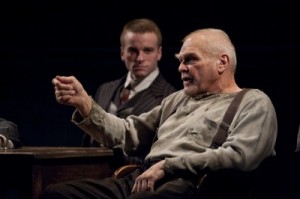 Is The Iceman Cometh too long, too schematic, and too wordy? Certainly. But when will we ever get a chance to attend a full-length revival of the play at such a lofty level of performance and staging, and when will we ever get another opportunity to watch Nathan Lane stretch his acting abilities in such a high-risk role? All in all, The Iceman Cometh reflects honor on everyone associated with it, including the audiences willing to invest 5 hours of their time to connect with one of the treasures of modern drama.
Is The Iceman Cometh too long, too schematic, and too wordy? Certainly. But when will we ever get a chance to attend a full-length revival of the play at such a lofty level of performance and staging, and when will we ever get another opportunity to watch Nathan Lane stretch his acting abilities in such a high-risk role? All in all, The Iceman Cometh reflects honor on everyone associated with it, including the audiences willing to invest 5 hours of their time to connect with one of the treasures of modern drama.
photos by Liz Lauren
The Iceman Cometh
Goodman Theatre in Chicago
scheduled to end on June 17
for tickets, call 312.443.3800 or visit http://www.goodmantheatre.org/iceman
for info on this and other Chicago Theater, visit http://www.TheatreinChicago.com
